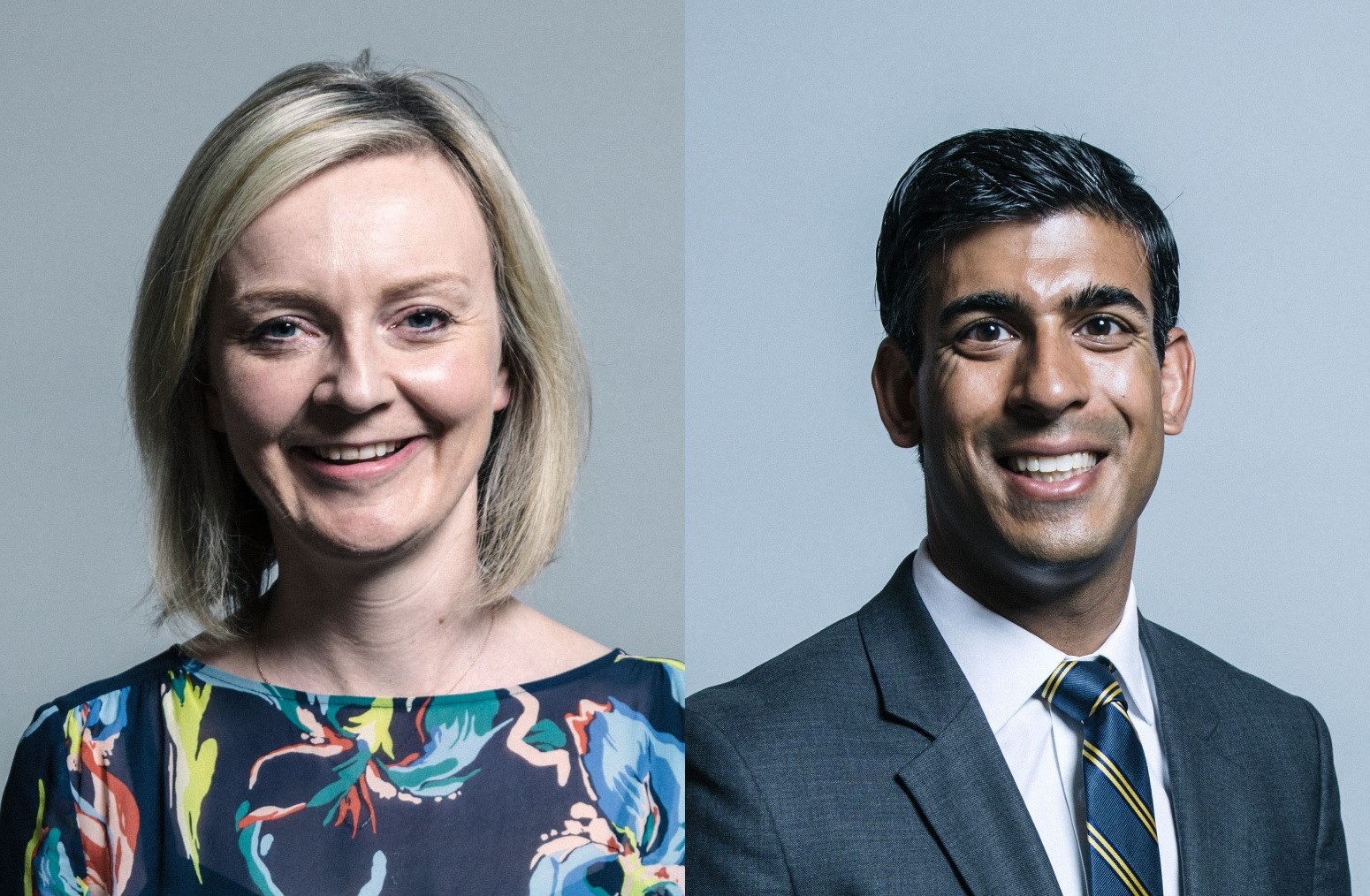Rishi Sunak and Liz Truss have become the last two candidates in the running for the title of Prime Minister, but what does their election mean for charities?
Since Boris Johnson’s resignation in early July, Conservative MPs have been battling it out to become the next party leader, with former chancellor Rishi Sunak, and foreign secretary Liz Truss landing themselves in the top two.
During their campaign to become party leader, neither candidate mentioned the charity sector specifically, but we’ve taken a look into their voting record as a possible indication of how future policies and candidates' opinions may affect the sector.
Rishi Sunak
According to his online voting record, Sunak has consistently voted for a reduction in spending on welfare benefits, and with the cost of living crisis, a reduction in benefits could put more pressure on charities helping those on low-incomes.
However, he has voted for raising the threshold at which people start to pay income tax and raised this in his role as chancellor, in addition to funding to help vulnerable people cope with the cost of living crisis, which was welcomed by some charities. Sunak also announced the coronavirus furlough scheme, which arguably saved jobs during the pandemic.
But, last year he was criticised for cutting a £20-a-week increase to Universal Credit that had helped some of the poorest families through the pandemic.
In terms of social issues, Sunak has abstained from votes on equal marriage and equal gay rights, and voted against laws to promote equality and human rights in addition to voting for a stricter asylum system, supporting Priti Patel’s Rwanda deportation plan.
For environmental issues, a growing part of the sector, Sunak has ‘almost always’ voted against measures to prevent climate change, and on Monday a high court judge ruled that the government’s net zero strategy was ‘inadequate’, giving ministers until March 2023 to change things – leaving Sunak with another challenge if he gets into office.
On his voting record, in February 2020, Sunak voted not to call on the government to make a plan to eliminate the majority of transport emissions by 2030.
He also voted not to reduce the permitted carbon dioxide emission rate of new homes and voted against setting a decarbonisation target in the UK, further voting to apply the 'climate change levy' to electricity generated from renewable sources.
Liz Truss
According to Truss’ voting record, the Foreign Secretary has consistently voted against raising benefits in line with inflation, and a reduction in spending on benefits.
She is considered the more right-wing candidate, but has generally voted in line with Sunak and also voted for a stricter asylum system and a stronger enforcement of immigration rules.
However, Truss has voted for equal gay rights and gay marriage, with a mixture of for and against votes for laws to promote equality and human rights.
In terms of the environment, Truss has recruited from and met with secretively funded climate sceptic think tanks in the UK and US.
In 2012, she also voiced support for not just a controversial third runway at London’s Heathrow Airport but a fourth – going further than the airport itself.
As environment minister in 2014, Truss cut subsidies for solar farms calling them a “blight on the landscape”. As solar costs fell, the UK’s solar capacity continued to rise regardless and Truss recently told a Conservative Environment Network (CEN) hustings that Russia’s war in Ukraine had strengthened the energy security case for clean energy.
A general election?
As with past leadership contests, there is a chance a general election could be called after the leadership contest, with precedent from both Teresa May and Boris Johnson. If a general election is called, it does mean certain things for charities.
In the short term, in the run-up to an election, there are particular legal and regulatory issues that charities need to bear in mind. In previous elections, charities have inadvertently been caught up in political campaigns in a way that damages their reputation and could result in them falling foul of the Charity Commission’s guidelines about political activities.
Guidance suggests charities should remember they are established for charitable purposes only, and that a purpose that is political cannot be charitable. That is not to say that charities cannot speak out and campaign on issues that are also being debated in the political arena, but any charity involving itself with political campaigning or political activity should only do so if this is a means of furthering its charitable purposes.
Charities also need to ensure that their campaigning and advocacy work does not have a party-political component. This means they can neither support or oppose a political party, but they can support or oppose a policy that is relevant to their charitable aims.
Charities must also not donate funds to political parties and cannot assist candidates with their election campaigns – financially or otherwise. However, there are many other things they can do, while maintaining political neutral.
On top of heeding the Commission’s guidance, charity trustees who engage in campaigning in the run up to an election may need to be aware of the requirements of the Lobbying Act.
There may be circumstances where spending money on activities would require the charity to be registered with the Electoral Commission as a non-party campaigner, so this could be worth checking.
Latest News
-
Volunteering rates rise but remain below pre-pandemic levels
-
Charities reducing their visibility amid ‘climate of fear’
-
Friday funding roundup - 12 December
-
Charity workers face threats of death and sexual assault, regulator's interim chair warns
-
Louise Dawtry: Transforming nonprofit culture
-
Charities welcome £500m investment in youth services
Charity Times video Q&A: In conversation with Hilda Hayo, CEO of Dementia UK
Charity Times editor, Lauren Weymouth, is joined by Dementia UK CEO, Hilda Hayo to discuss why the charity receives such high workplace satisfaction results, what a positive working culture looks like and the importance of lived experience among staff. The pair talk about challenges facing the charity, the impact felt by the pandemic and how it's striving to overcome obstacles and continue to be a highly impactful organisation for anybody affected by dementia.
Charity Times Awards 2023
Mitigating risk and reducing claims

The cost-of-living crisis is impacting charities in a number of ways, including the risks they take. Endsleigh Insurance’s* senior risk management consultant Scott Crichton joins Charity Times to discuss the ramifications of prioritising certain types of risk over others, the financial implications risk can have if not managed properly, and tips for charities to help manage those risks.
* Coming soon… Howden, the new name for Endsleigh.
* Coming soon… Howden, the new name for Endsleigh.
Better Society

© 2021 Perspective Publishing Privacy & Cookies











Recent Stories